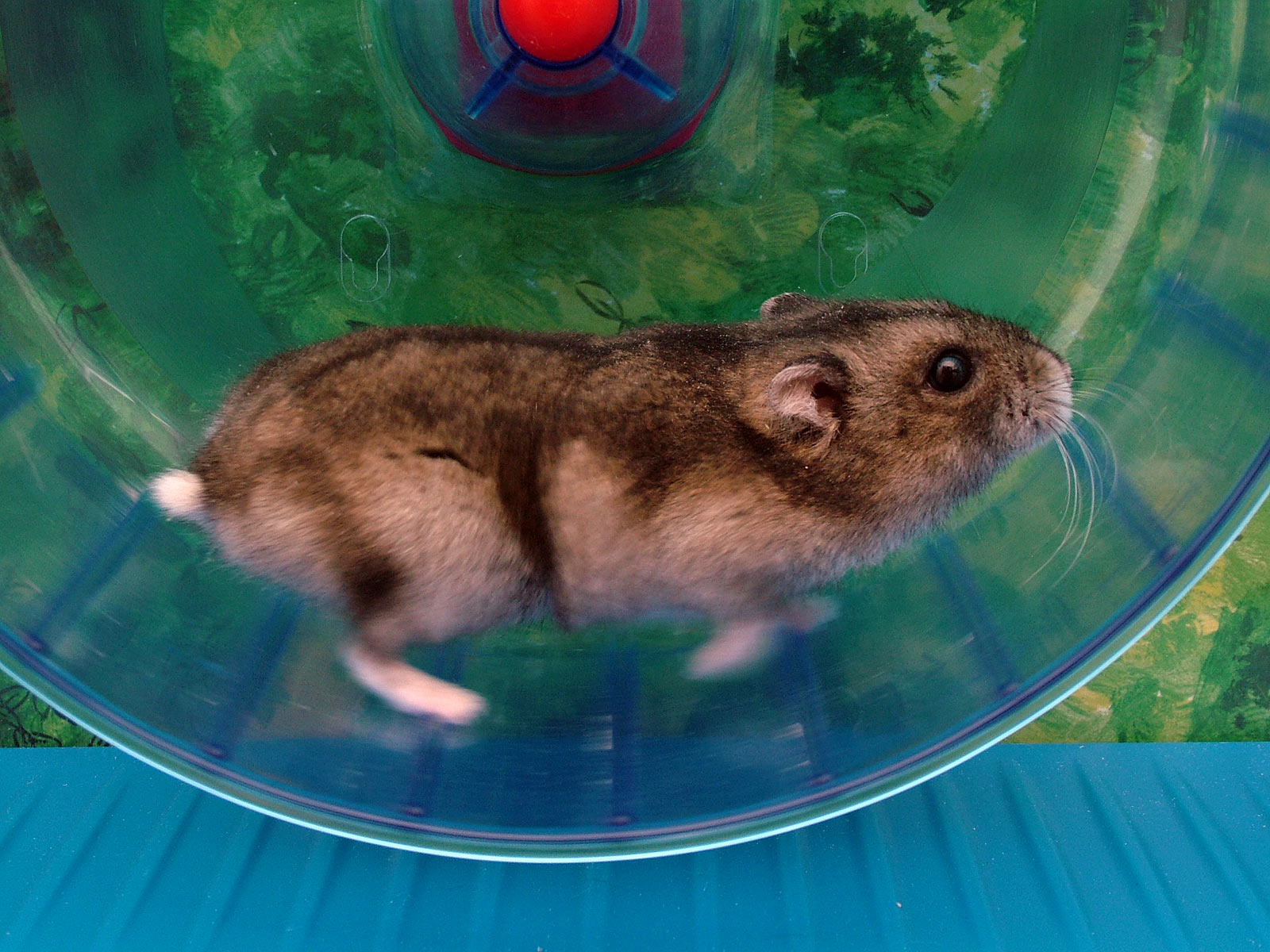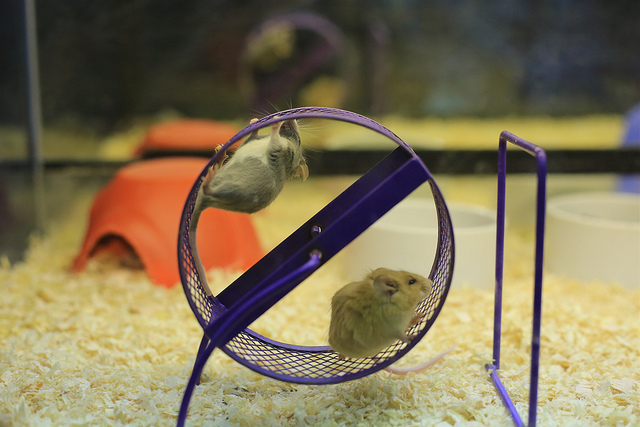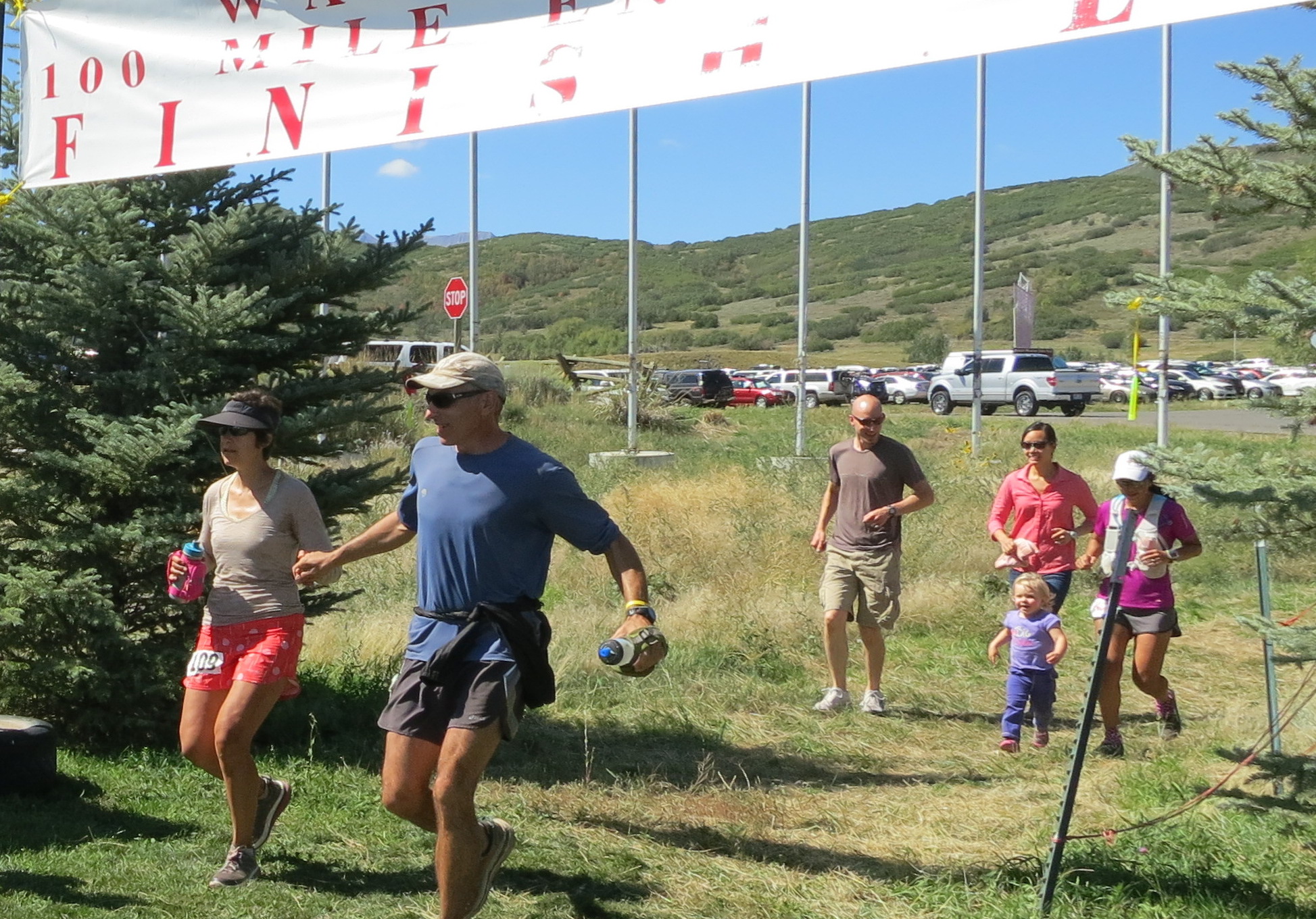
Hamster in a wheel, running just cuz it’s fun. Maybe.
I’ve been running for 27 years.
At least half of those years were “seasonally” around two-thirds of the year or so, in fair weather or around the competitive season. When I was off, I was really off, not doing much of anything for several months (youthful metabolism is what made that tenable for so long). However, the last decade has been year-round training – and not because of slowing metabolism, but rather to be more competitive and get rid of the inevitable training curve/wall after a few months off. I did get faster – and I got skinnier – and how the two are related and not related is another story.
It took many years of those 27 before I had any idea that running was anything but super awesome for the human body. I mean, how could it not be? All that fitness and endorphins and pleasant exhaustion…. Hell, even mice like to run for no reason at all. I looooove this! Some animals, including we crazy humans, like to run just to run. Brain cells grow, stress hormones go down (within some limits), and things are just good. Usually.
But there’s two sides to the endurance running deal. The benefits of judicious jogging seem to be pretty clear: all the stuff mentioned above like better thinking, lower disease markers, lower stress, better cardiovascular fitness, et cetera. But when you get into territory like many habitual runners – an hour or more every day on average, with more on weekends or race days – that’s when the benefits rocket down to zero or below.
Net Negative Benefits?
Why? Right now I think there are two main areas of concern: atrial fibrillation and movement monotony.
Atrial Fibrillation
In some adults – those with a predisposition, it seems – endurance athletics will bring out their latent Atrial Fibrillation (“AFib” to the cool kids) where it might have been dormant for a lifetime of less vigorous movement. Only a few years ago it was easy to dismiss the folks who collapsed and died during marathons as pure probability given the population numbers. Those fatalities are still explainable by demographics, BUT there are likely a lot more runners out there with ticking AFib bombs in their chests. A google search for “atrial fibrillation endurance athletes” turns up 3190 results. Yowch.
So, this is just like the misconception that running will GIVE you knee problems when in fact it is slightly protective of your knees in general. What happens is that your knees – if they’re normal – will be benefited from running. If you are prone to knee problems like arthritis or degeneration, you *might* notice those issues sooner because you as an athlete are more in tune with your body and you demand more of it. Running does NOT cause knee problems.
Likewise, running does not seem to cause heart attacks or sudden death, but for some people it functions as a very sobering “stress test” and can make their life quite a bit shorter.
Finally, many, many years of running might actually contribute to AFib. That’s the thing that as a runner you should know about. Not necessarily worry about, but definitely consider it if you are actively choosing to be a runner instead of taking up other pursuits. The research is still ongoing, but it does not look like a win for running when it comes to AFib. Aside from the medical research, there are some runners and medical professionals blogging about the nexus of AFib and athletics, like Michael McCullough’s site AFibRunner, a great reading for all endurance athletes. I also like the site Athlete’s Heart by Dr. Larry Creswell – he is looking at the issue as a very interested 3rd party point of view. Good stuff.
Movement Monotony
Trust me when I say I will have a lot more to write about this, so this little paragraph is but the beginning. Here’s the nutshell. Many endurance runners like myself have desk jobs. We move from the coffee pot to the chair to the bathroom and back just a few times per day. Then we sit down to eat. We sit down to read. We go to sleep and we wake up and run for an hour and think we’re OK. We are not OK. I repeat – we are not OK.
In the always spot-on words of Katy Bowman, we athletes are doing the equivalent of saying to ourselves, “Hey, oranges have vitamins! I’m gonna eat 20 and then have some milkshakes!” We are taking in movement nutrients that are vastly inadequate and unvaried. We should be getting up from the chair every 20 minutes to bend and stretch and focus on the wall 20 feet away. We should take walks in the sunshine and squat down to pick up our groceries and kids. And then, maybe if we want, then we can do something as ‘crazy’ as striking the ground at 2.5x our body weight for 6000 reps (the amount of footstrikes in a 6 mile run)!!!
Ok, more Katy to come. Don’t worry.
After all that… why in the heck do I and we run?
Here’s what I know: the main benefit to me is in my inner world. What I mean by that is I get good shots of positive neurotransmitters (the runner’s high) in addition to mental calming and the ability to brainstorm and daydream while out there. This is why I don’t listen to music during 99% of my training time. Now, the runner’s high is real and can be proven by lots of research. But – and this is a big but – the rest of it might just be a self-reinforcing addiction. I get to daydream and clear my head because that’s what I expect from running. It calms me because I haven’t figured out any other way to calm my caucophony.
THERE ARE OTHER WAYS. There’s gentle yoga (not that power/hot stuff – that’s also addictive). There’s just daydreaming while taking a long walk. There’s meditation. All of these involve minimal exertion while having proven mental benefits.
And, I love my running friends, all over the country. I am able to go and experience beauty and connection and soul-crushing fatigue in myself and in those around me, and we get through it. When it’s almost over, we see our families and cross that line and it’s magical. How could you not love my 2 year old niece running to catch me in this photo???
I know all of this. If someone new to exercise or fitness or general lifestyle health were to ask me “what should I do?” I would NEVER tell them to take up jogging or running. If one is starting from scratch or starting over, everything I know suggests that we should do three major things with our time. In order from most time spent to least, those three would be: tons of general movement and walking, meditation, and power bursts (sprints, climbing, jumping, weights).
Running is for becoming a better runner. Period. And becoming a better runner all by itself just might make you a more fragile organism if movement monotony isn’t balanced with really well-rounded movement nutrients in the rest of your life. Here’s to a long and movement-filled life.


2 thoughts on “I Love To Run Even Though It Could Hurt Me”